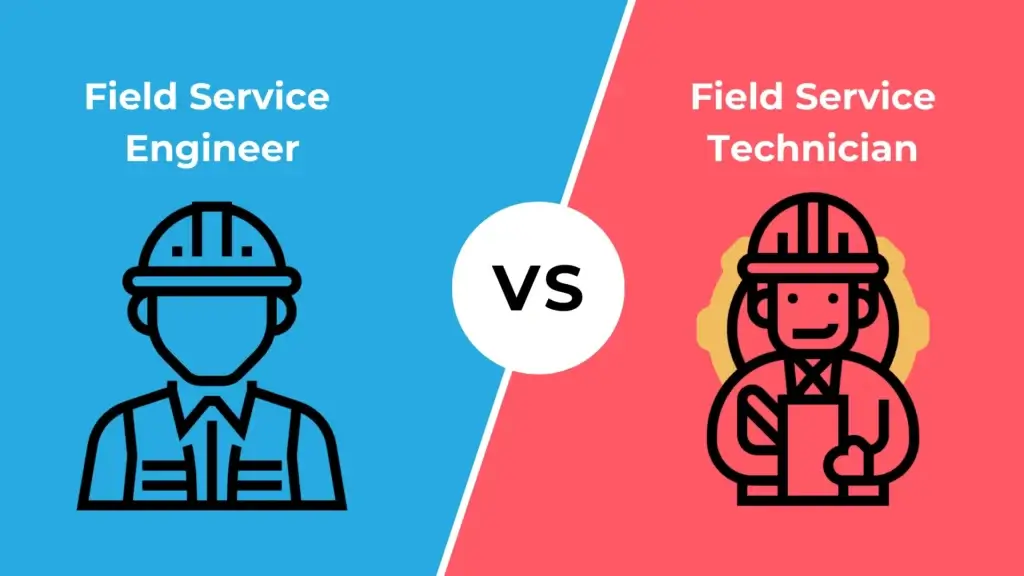What is a Field Service Engineer?
A Field Service Engineer is a specialist who focuses on the installation, maintenance, and repair of technologically complex systems and equipment. They're often employed in sectors like telecommunications, manufacturing, and IT. Their role generally involves resolving technical issues, providing expert advice, and ensuring optimal equipment performance.What is a Field Service Technician?
A Field Service Technician is mainly responsible for troubleshooting and repairing equipment and systems. While they may work closely with engineers, their focus tends to be on hands-on repair and maintenance of technology rather than design or advanced technical support. Technicians often work in various sectors, including appliances, consumer electronics, and industrial machinery.Role Of Field Service Engineers vs Technicians
Both roles serve essential functions within an organisation, but they approach their tasks from different perspectives. Below is a comparison table that highlights the differences between field service engineer vs technician:| Aspect | Field Service Engineers | Field Service Technicians |
| Education | Typically, hold a bachelor's degree in engineering or a related field | May have an associate degree or vocational training |
| Technical Skills | Advanced technical skills, problem-solving capabilities, and system design knowledge | Practical skills for installation, maintenance, and repair |
| Certifications | Often hold professional engineering licenses or certifications relevant to their specialisation | Certifications may focus on specific equipment or systems (e.g., HVAC, electronics) |
| Work Environment | Typically work in diverse settings, including client sites, manufacturing facilities, and sometimes remote locations | Primarily work on-site at facilities, repair shops, or client premises |
| Problem-Solving | Address complex, high-level issues requiring critical thinking and innovation | Resolve daily operational issues and perform routine problem-solving |
| Client Interaction | Frequently engage with clients, often in a consultative role | Interact with clients, but mainly focused on task execution and support |
| Travel Requirements | Often required to travel extensively to client locations or project sites | May have limited travel, depending on the job requirements |
| Salary Range | Generally, a higher salary for field service engineers due to advanced skills and responsibilities | Typically, a lower salary range; varies based on experience and industry |
| Career Advancement | Opportunities to advance to managerial or higher engineering positions | Opportunities to specialise or advance into engineering or supervisory roles |
Educational Background and Qualifications Field Service Engineers vs Technicians
Field Service Engineers usually have a degree in engineering or a related technical field, such as electronics, mechanical engineering, or information technology. This advanced educational background provides them with comprehensive knowledge of complex systems and technical principles, enabling them to address intricate challenges in various industries. The rigorous coursework typically covers subjects like circuit design, programming, systems integration, and project management. Consequently, Field Service Engineers are well-prepared to handle complex technical issues and design innovative solutions tailored to specific customer needs.Moreover, many Field Service Engineers further enhance their qualifications by obtaining professional certifications relevant to their industry. Such certifications may include specialised training in equipment installation, maintenance practices, or troubleshooting methodologies. These credentials bolster their expertise and increase their marketability in the job market, potentially leading to higher pay scales, such as the salary of a field service engineer.On-the-job training also plays a critical role in developing Field Service Engineers' skills. As they gain practical experience in the field, they become more adept at understanding the intricacies of the systems they work with and the specific requirements of their clients. Their advanced education, combined with practical training, equips them with the necessary competencies to excel in their roles, ensuring they can provide effective and efficient service to customers.In contrast, field service engineer vs technician typically require a diploma or specialised vocational training, focusing more on practical skills and hands-on experience than theoretical knowledge. Educational programmes for Technicians often include a combination of classroom instruction and fieldwork, providing them with the opportunity to gain real-world experience from the outset. This practical training is crucial as it places an emphasis on learning how to operate, troubleshoot, and repair a variety of systems and equipment.Common fields of study for aspiring Field Service Technicians may include industrial maintenance technology, mechatronics, or electronics technology. These programmes often cover essential topics such as electrical systems, mechanical systems, and troubleshooting techniques. While a degree is not always required, many employers prefer candidates with certifications that validate their skills, such as those offered by industry-recognised bodies.Field Service Technicians also receive ongoing training to stay current with evolving technologies and industry standards. This commitment to lifelong learning enables them to keep pace with advancements in tools, machinery, and systems. Such proactive development not only enhances their skill sets but can also positively influence their career trajectory, leading to increased responsibilities and potentially higher earnings, thereby closing the gap between the field services technician salary and that of Field Service Engineers.In summary, while both field service engineers vs technicians play critical roles in the field service industry, their educational backgrounds and qualifications differ significantly. Engineers often pursue higher education in engineering or a related field, coupled with advanced certifications, while Technicians typically focus on vocational training and hands-on experience. Understanding these differences can offer valuable insights for businesses seeking to hire the right professionals and for individuals considering a career in the field service sector.Core Responsibilities Field Service Engineers vs Technicians
Understanding the core responsibilities of field service engineer vs technicianis essential for understanding how these roles contribute to the success of any organisation that relies on field services. While both positions share the common goal of ensuring equipment functionality and customer satisfaction, their specific responsibilities differ significantly because of the technical depth and nature of their roles. Field Service Engineers regularly engage with complex technical systems and require specialised knowledge to design solutions, whereas Field Service Technicians focus on the practical aspects of equipment upkeep and repairs. By examining the specific tasks associated with each role, we can better appreciate their unique contributions to the field service management framework.Field Service Engineer Roles and Responsibilities
Field Service Engineer responsibilities include:- Installing and configuring complex equipment and systems: Field Service Engineers are responsible for the initial setup of high-tech equipment, ensuring every component is optimally placed and integrated for best performance. This often necessitates understanding intricate designs and specifications unique to each system.
- Conducting diagnostics and troubleshooting to resolve technical issues: When equipment malfunctions crop up, Field Service Engineers step in to conduct detailed diagnostics. Their engineering background allows them to pinpoint the root causes of issues and implement effective solutions that not only fix the immediate problem but also help avoid future headaches.
- Liaising with the engineering team to address design flaws or improvements: A crucial part of their role includes working closely with design engineers. By providing feedback based on their field experiences, they can influence improvements and modifications in design, resulting in better products and services.
Field Service Technician Role
Field Service Technician roles mainly include:- Performing regular maintenance checks on equipment: Field Service Technicians are responsible for ensuring that equipment remains in top operating condition. This involves carrying out routine maintenance checks to spot any potential issues before they snowball into serious problems. Regular inspections help prolong the life and boost the efficiency of the equipment.
- Responding promptly to service calls for repairs: When clients face equipment malfunctions, Field Service Technicians are expected to respond swiftly. Their ability to efficiently diagnose issues in good time is crucial, as extended downtime can lead to operational setbacks for customers. Prompt responses are key to maintaining strong customer relationships and trust.
- Diagnosing and fixing malfunctioning equipment: A key aspect of a Technician’s role involves troubleshooting faulty equipment. They use their practical skills and technical know-how to diagnose issues and apply effective repairs. This hands-on problem-solving ability ensures machinery continues running correctly and supports overall operational efficiency.
Skill Sets and Competencies of Field Service Engineers vs Technicians
In the field service industry, the demand for highly skilled professionals is ever-increasing, and the skill sets required for Field Service Engineers and Field Service Technicians differ significantly. Understanding these competencies is vital for both organisations looking to hire the right talent and individuals aspiring to enter this dynamic field. Field Service Engineers typically need a solid analytical mindset, advanced technical skills, and the ability to navigate complex systems. In contrast, Field Service Technicians are often required to have practical problem-solving skills, manual dexterity, and customer service know-how.Both roles demand a unique blend of technical expertise and interpersonal abilities, but their focuses vary to address the challenges found within their specific responsibilities. By examining the specific skill sets and competencies of each role, we can form a clearer picture of what makes both Field Service Engineers and Technicians invaluable assets within any operational framework.Field Service Engineer Skills
Field Service Engineers typically require a deep understanding of engineering principles and complex systems. This includes expertise in areas such as software engineering, network protocols, and hardware configurations.- Problem-Solving Abilities: Their role often involves diagnosing advanced technical issues. Engineers must think critically, apply engineering concepts, and develop innovative solutions to intricate problems that arise in the field.
- Strong Communication Skills: Liaising with clients and collaborating with engineering teams requires excellent verbal and written communication skills. Field Service Engineers must convey complex technical information clearly and concisely to clients who may not have the same level of technical understanding.
- Project Management Skills: Many Field Service Engineers are involved in comprehensive projects, necessitating strong organisational and project management abilities. They often oversee the complete installation and functionality of systems, coordinating timelines and managing resources effectively.
Field Service Technician Skills
Practical skills are the cornerstone of a Field Service Technician's expertise. This includes an aptitude for performing repairs, conducting maintenance tasks, and troubleshooting equipment—a skill set finely honed through hands-on training and experience.- Customer Service Orientation: Technicians frequently interact with clients and must present themselves professionally. Effective listening skills and the ability to understand and address customer concerns are vital for fostering a positive customer experience.
- Time Management Skills: Field Service Technicians often handle multiple service calls in a single day. Strong time management skills and the ability to prioritise tasks ensure that they meet customer demands promptly and efficiently.
- Attention to Detail: Precision is key when diagnosing issues and making repairs. Technicians must be detail-oriented, ensuring that every aspect of their work meets safety and industry standards to prevent future malfunctions.

 English (US)
English (US)  English (GB)
English (GB)  English (CA)
English (CA)  English (AU)
English (AU)  English (NZ)
English (NZ)  English (ZA)
English (ZA)  Español (ES)
Español (ES)  Español (MX)
Español (MX)  Español (AR)
Español (AR)  Português (BR)
Português (BR)  Português (PT)
Português (PT)  Deutsch (DE)
Deutsch (DE)  Deutsch (AT)
Deutsch (AT)  Français (FR)
Français (FR)  Français (BE)
Français (BE)  Français (CA)
Français (CA)  Italiano
Italiano  日本語
日本語  中文
中文  हिन्दी
हिन्दी  עברית
עברית  العربية
العربية  한국어
한국어  Nederlands
Nederlands  Polski
Polski  Türkçe
Türkçe  Українська
Українська  Русский
Русский  Magyar
Magyar  Română
Română  Čeština
Čeština  Български
Български  Ελληνικά
Ελληνικά  Svenska
Svenska  Dansk
Dansk  Norsk
Norsk  Suomi
Suomi  Bahasa
Bahasa  Tiếng Việt
Tiếng Việt  Tagalog
Tagalog  ไทย
ไทย  Latviešu
Latviešu  Lietuvių
Lietuvių  Eesti
Eesti  Slovenčina
Slovenčina  Slovenščina
Slovenščina  Hrvatski
Hrvatski  Македонски
Македонски  Қазақ
Қазақ  Azərbaycan
Azərbaycan  বাংলা
বাংলা 

